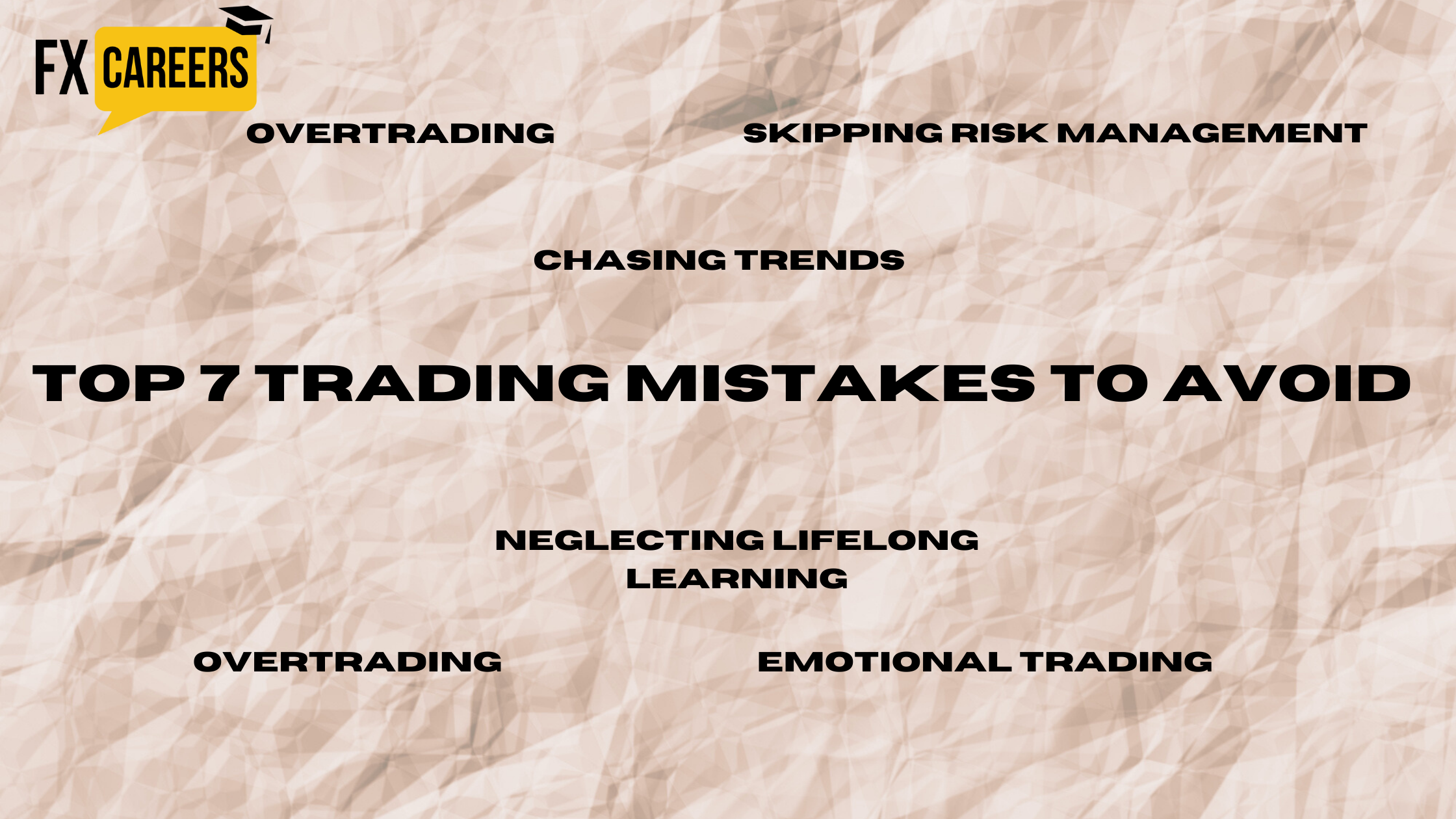FXCareers Blogs
 Go Back Home
Go Back Home

 04-11-2024
04-11-2024 5 minutes of Reading
5 minutes of Reading
Top 7 Trading Mistakes to Avoid for Better Results
The attraction of financial markets is undeniable. The potential for substantial profits draws countless individuals to trading. Yet, despite its appeal, trading demands far more than a casual interest. It requires discipline, strategy, and a deep understanding of market behaviour. Like creating a masterpiece in the kitchen, trading isn't a matter of random actions. You don’t throw ingredients into a bowl and hope for the best. Instead, you measure, refine, and follow a process. Trading follows a similar recipe, one where the outcome shapes your financial future. Success here is built on a blend of knowledge, a well-thought-out plan, and steadfast discipline.
This article explores seven major mistakes traders often make. By understanding these pitfalls, you can approach trading with clarity and purpose, steering clear of common traps and staying focused on achieving your financial goals.
1. Overtrading:
One of the most frequent missteps in trading is overtrading. This happens when traders initiate excessive trades, often without a structured approach or careful risk management. Overtrading usually stems from impulsive decisions and can inflate transaction costs, heighten emotional responses, and increase the probability of losses. In trading, patience is just as valuable as knowledge, if not more.
2. Skipping Risk Management
Risk management is the backbone of successful trading. Surprisingly, many traders neglect to set up stop-loss and take-profit orders, crucial for protecting their capital and securing gains. A solid risk management plan is a guardrail that keeps you from falling off the financial cliff. You expose yourself to potentially devastating losses without it, leaving your success to sheer luck.
3. Chasing Trends
Trend-chasing is a trap that entices traders to jump in after a trend has already begun, hoping to benefit from its momentum. However, financial markets are fluid, and trends can shift without warning. Late entries into trends often lead to high-risk positions, especially if the trend reverses unexpectedly. This practice isn’t sustainable and often ends in disappointment.
4. Emotional Trading
Emotional trading is a common pitfall that can derail even the most experienced traders. When fear or greed takes over, judgment becomes clouded, leading to impulsive actions that deviate from a trader’s original plan. Building emotional discipline and sticking to a clear, pre-defined strategy is essential to maintain control and make rational decisions under pressure.
5. Neglecting Lifelong Learning
Financial markets evolve continuously, influenced by new technologies, economic shifts, and changing regulations. Traders who fail to keep up with the latest trends, methodologies, and financial indicators risk falling behind. Lifelong learning isn’t just an option; it’s a necessity in the trading world, helping you adapt and make informed decisions.
6. Skipping a Trading Journal
A trading journal is a trader’s mirror. Documenting each trade, analyzing past performance, and identifying mistakes help traders refine their strategies and avoid repeating errors. This self-reflective tool fosters growth, providing insights into both successful and unsuccessful trades, leading to more informed choices over time.
7. Lack of Diversification
Diversification is a foundational principle in investment, yet many traders overlook its importance. Concentrating all investments in a single asset or strategy significantly increases risk. Spreading assets across various markets or instruments reduces exposure to any one market’s downturn, ensuring a more balanced portfolio.
A Thoughtful Approach to Trading Success
Avoiding these common mistakes paves the way for more successful trading. Consistent growth, rather than instant wins, should be your ultimate aim. By embracing discipline, patience, and a genuine desire to learn, trading can evolve into a rewarding journey that builds both financial skills and wealth over time.

Want to Expert in Trading?
One Step a Way
Start building your trading skills for a successful financial future.
Get Started

